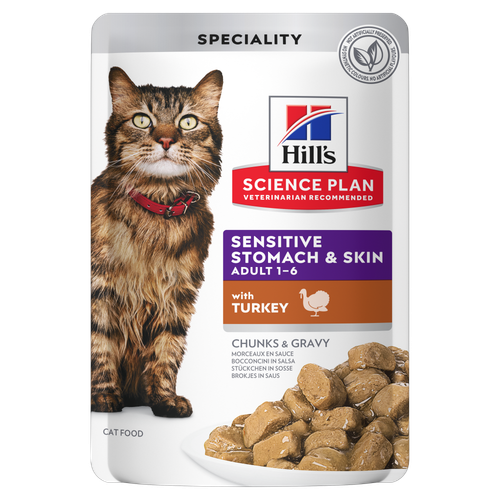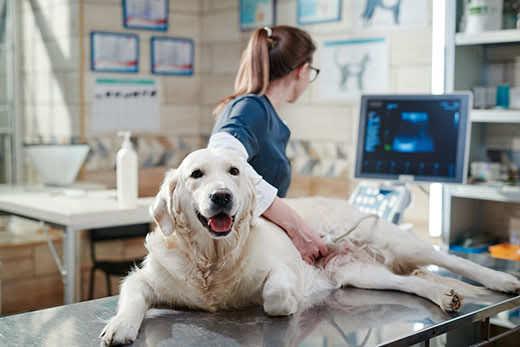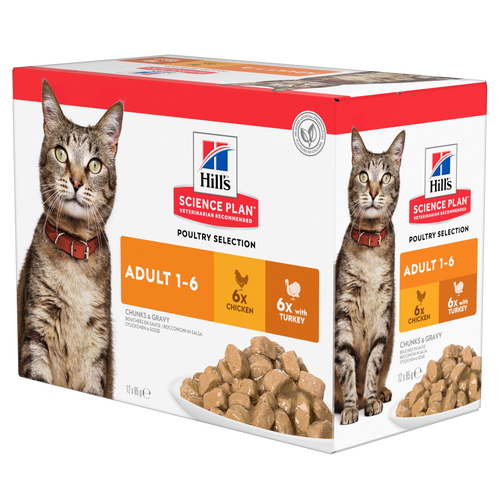
-
Find the right food for your petTake this quiz to see which food may be the best for your furry friend.Find the right food for your petTake this quiz to see which food may be the best for your furry friend.Featured products
 Mature Adult Dog Food
Mature Adult Dog FoodHill's Science Plan Mature Adult Multipack Wet Dog Food with Chicken & Beef are complete premium pet foods for mature adult dogs from 7 years. Your dog will love these deliciously smooth and savoury minced loaves, formulated to deliver the appropriate amount of energy to support the needs of adult dogs.
Shop Now Puppy Food
Puppy FoodHill's Science Plan Puppy Multipack Wet Dog Food with Chicken & Beef are complete premium pet foods for growing puppies from weaning until 1 year old and for pregnant and nursing dogs. Your puppy will love these deliciously smooth and savoury minced loaves, formulated for balanced nutrition and overall health.
Shop Now Adult Wet Dog Food with Beef
Adult Wet Dog Food with BeefHill's Science Plan Adult Multipack Wet Dog Food with Chicken, Beef & Turkey are complete premium pet foods for adult dogs from 1 year. Your dog will love these deliciously smooth and savoury minced loaves, formulated for balanced nutrition and overall health.
Shop NowFeatured products Hairball & Perfect Coat Adult Dry Cat Food with Chicken
Hairball & Perfect Coat Adult Dry Cat Food with ChickenHill's Science Plan Hairball & Perfect Coat Adult Cat Food with Chicken is formulated to effectively help avoid hairball formation in adult cats while promoting a beautiful coat. Thanks to its mix of essential omega-6 fatty acids, this food benefits the cat's skin and fur, keeping them healthy and shiny. Our Advanced Fibre Technology helps reduce hairballs by naturally promoting their passage through the gut. This food is formulated with high-quality protein for a perfectly balanced, great-tasting recipe.
Shop Now Sensitive Stomach & Skin Adult Cat Food
Sensitive Stomach & Skin Adult Cat FoodHill's Science Plan Sensitive Stomach & Skin Adult Wet Cat Food with Turkey is a complete pet food for adult cats, aged 1–6 years. This highly digestible wet food comes in a pouch and supports healthy digestion, as well as nourishes skin and promotes a thick and lustrous coat.
Shop Now Sterilised Adult Cat Food
Sterilised Adult Cat FoodHill's Science Plan Adult Sterilised Cat Dry Food with Salmon is specially formulated with ActivBiome+ Multi-Benefit Technology. It is a precisely balanced nutrition, tailored to meet the needs of sterilised cats, to help keep them lean & healthy.
Shop Now -
Dog
- Dog Tips & Articles
-
Health Category
- Weight
- Food & Environmental Sensitivities
- Urinary
- Digestive
- Joint
- Kidney
-
Life Stage
- Puppy Nutrition
- Adult Nutrition
- Senior Nutrition
Cat- Cat Tips & Articles
-
Health Category
- Weight
- Skin & Food Sensitivities
- Urinary
- Digestive
- Kidney
-
Life Stage
- Kitten Nutrition
- Adult Nutrition
Featured articles Show some love with wet foods: a great choice for pets with health issues
Show some love with wet foods: a great choice for pets with health issuesShow some love with wet foods: a great choice for pets with health issues.
Read More The Right Diet For Your Pet
The Right Diet For Your PetIn people, the right diet is very important. If you are eating the wrong way for your metabolism, activity level, age and lifestyle you could end up with health issues.
Read More The Incredible Science Behind Your Pet's Microbiome
The Incredible Science Behind Your Pet's MicrobiomeLearn what your pet's microbiome is, how it contributes to your pet's gut and overall health, and why nutrition is important in maintaining healthy microbiomes.
Read More -


A pet cancer diagnosis can feel scary, overwhelming and devastating. Your veterinary care team understands these emotions, as well as your concerns about the future and the anxiety you might feel about treatment options. The good news is that advances in veterinary oncology result in cancer remission for many pets and improve their quality and quantity of life. If your furry family member has been diagnosed with cancer, this article can help guide you through the journey.
Pet Cancer Diagnosis
To diagnose cancer in your pet, your veterinarian will start by asking about any signs or symptoms you may have noticed. As with humans, there are lots of different cancers that can affect pets, with a wide range of potential signs and symptoms. As a general rule of thumb, you should visit your vet whenever you see a change in your pet’s appearance, behaviour, or general wellbeing.
Your vet will confirm or rule out cancer by evaluating your pet’s overall health and running some tests. Preliminary testing often includes blood and urine tests, microscopic evaluation of cells or samples from any tumours, and imaging studies such as radiographs (X-rays) and ultrasounds. These tests provide basic information about your pet's health and help determine if cancer is present, the type of cancer and whether it has spread to other organs. This information allows your vet, or a vet certified in veterinary oncology, to give you a prognosis and recommend treatment.



Tasty Tips
Young pets may need several visits in their first year for vaccinations. Adult pets generally benefit from annual check-ups, while senior or special-needs pets might require more frequent visits.
Pet Cancer Treatment
The available pet cancer treatment options are much the same as cancer treatments for humans. The main difference is that pets tend to have fewer negative side effects with chemotherapy; they rarely experience nausea or lose their hair. Your pet is likely to have a better chance of survival if you follow the treatment plan laid out by your vet, which can include one or more of the following therapies.
Surgery
Surgery is used to remove cancerous growths and may be curative with some cancers, such as in complete removal of a low-grade mast cell tumour. Surgery can also be used in conjunction with other treatments to completely remove cancer from your pet's body.
Chemotherapy
This method uses medication to kill cancer cells and is part of most cancer treatment plans. Chemotherapy drugs can be taken orally in pill form or administered intravenously (into a vein) by a veterinary professional.
Radiation
Radiation is used to shrink tumours before surgery, kill cancer cells that are left behind after surgery, and slow down cancer growth in parts of the body where surgery isn't possible — in the nose, for example. Pets usually require several doses of radiation. Keep in mind that radiation centres are typically only available in highly specialised veterinary hospitals, and may involve high costs.
Immunotherapy
Immunotherapy uses a vaccine to stimulate a pet's immune system to fight off cancer cells. This therapy is used in canine melanoma and is being explored as an option to treat osteosarcoma.
Palliative Care
Pet cancer can't always be cured. Palliative care focuses on maximising your pet's quality of life during the time they have. This may involve controlling pain, minimising nausea and helping you understand when it's time to say goodbye. Palliative surgery may be used to stop pain, especially in dogs diagnosed with bone cancer. Also, good nutrition is essential during palliative care, so it’s important to have a conversation with your veterinarian to discuss diet and nutritional needs for your pet. The silver lining is that palliative care can often provide weeks to months of quality, pain-free time with your pet that you might not have otherwise had — and that's truly precious.
What to Expect When Your Pet Has Cancer
Depending on the type of cancer your pet has, their overall health and age, and the treatments they're receiving, there may be some changes at home. For example:
- If your pet has had surgery, they'll need time and at-home care to recover.
- Your pet may sleep more and eat less if they have a type of cancer that causes loss of appetite or energy. Don't push them to exercise, and let them self-regulate their activity. If you have a dog, continue to take them outside daily for fresh air and sunshine. If your pet isn't eating, your vet may prescribe an appetite stimulant or change their food.
- If your pet has brain cancer, you might notice changes in cognition such as loss of learned behaviours. They may also develop seizures, which will need to be managed with medication.
- Cancer or cancer treatments can sometimes cause urine or bowel control issues. Your pet may need to relieve themselves more often as a result, and may be more prone to accidents in the home.
- Expect frequent veterinary visits. If your pet is receiving treatment, your vet will need to do additional testing during and after treatment to assess how well it's working. Treatment can be costly, so if you have pet insurance, be sure to have a discussion with your provider at the earliest opportunity to understand what your policy covers.
When your pet is under palliative care, it can be hard to know when they need veterinary intervention and when it's time to say goodbye. The PDSA has a quality-of-life assessment checklist that may help.
The concept of caregiver burden in humans caring for other sick humans is well documented, but according to research discussed in the British Medical Journal, it's also a very real problem faced by people who are caring for chronically or terminally ill pets. If you're the caregiver, take care of yourself and enlist support where you can. Organisations such as Blue Cross offer resources such as free and confidential counselling, along with opportunities to connect with other pet parents who understand what you’re going through. Contact the Blue Cross Pet Bereavement Support Service by phone on 0800 096 6606, by email at pbssmail@bluecross.org.uk, or online via live chat.
A pet cancer diagnosis can be overwhelming, but your vet is here to help you navigate the process. Grieving is also a normal part of dealing with pet cancer. If you're struggling, consider reaching out for support so you can make the most of the time you have left with your precious pet.


Dr. Sarah Wooten graduated from UC Davis School of Veterinary Medicine in 2002. A member of the American Society of Veterinary Journalists, Dr. Wooten divides her professional time between small animal practice in Greeley, Colorado, public speaking on associate issues, leadership, and client communication, and writing. She enjoys camping with her family, skiing, SCUBA, and participating in triathlons.
Related products

Tender chicken chunks in gravy for cats, with L-carnitine and fewer calories for ideal weight management. Packed with high-quality protein, omega-6s, and vitamin E for shiny fur and healthy skin.

Tender chunks in gravy for cats, with high-quality protein to maintain lean muscle. With vitamin E and omega-3s & -6s for healthy skin and balanced minerals to support healthy vital organs.

Tender chicken chunks in gravy for mature adult cats. Made with easy-to-digest ingredients, high-quality protein for lean muscle maintenance and antioxidant vitamins C+E for optimal health.

Related articles

To make a protein, amino acids are linked together in a long chain. The chain is then bundled into to a three-dimensional structure, like a tangled ball of yarn.

Learn what your pet's microbiome is, how it contributes to your pet's gut and overall health, and why nutrition is important in maintaining healthy microbiomes.

In people, the right diet is very important. If you are eating the wrong way for your metabolism, activity level, age and lifestyle you could end up with health issues.

Show some love with wet foods: a great choice for pets with health issues.

Put your pet on a diet without them knowing
Our low calorie formula helps you control your pet's weight. It's packed with high-quality protein for building lean muscles, and made with purposeful ingredients for a flavourful, nutritious meal. Clinically proven antioxidants, Vitamin C+E, help promote a healthy immune system.
Put your pet on a diet without them knowing
Our low calorie formula helps you control your pet's weight. It's packed with high-quality protein for building lean muscles, and made with purposeful ingredients for a flavourful, nutritious meal. Clinically proven antioxidants, Vitamin C+E, help promote a healthy immune system.

